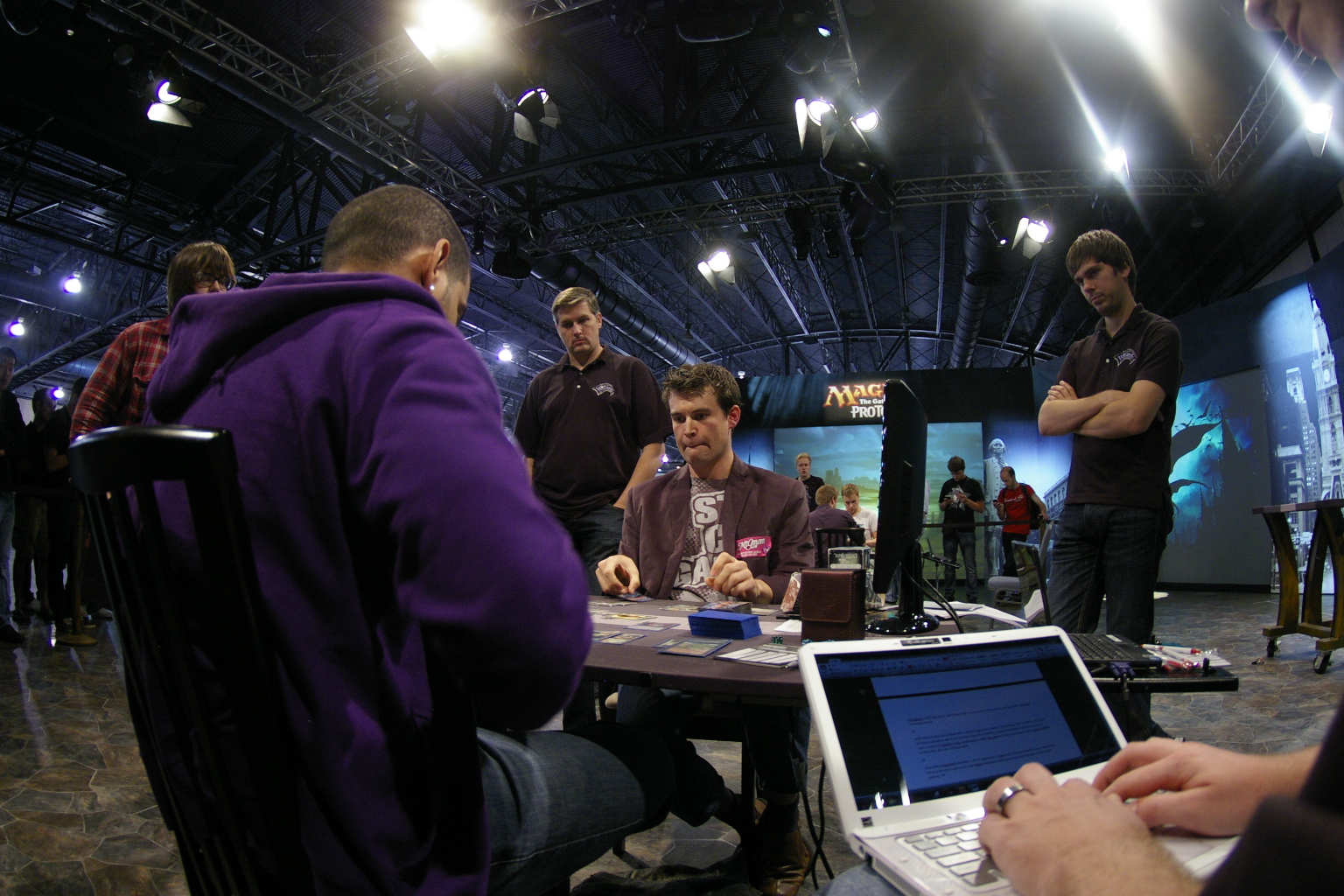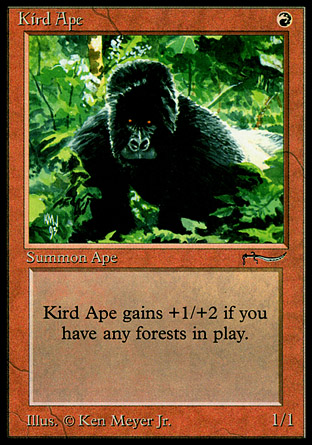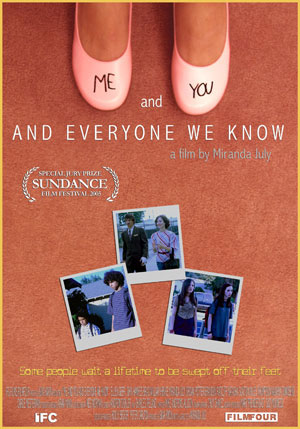Magic & Writing & Me
I started playing Magic in the fall of 1994, when I arrived at college, and when the game was only a year old. My then girlfriend got me into it, in a reverse of a common geek stereotype. (I knew several female Magic players in college.) I quit playing four years later, right before graduation, selling off all of my cards (including a Timetwister!), but I’ve continued to vicariously follow the game since. I rarely play, but I did draft some of Ravnica Block (so awesome), and just last week I played in a M13 draft while visiting friends in Philadelphia. I lost in the first round, 0–2—I’m a terrible player, very out of practice—although later I did win a thee-person game of Commander, over dinner at a diner, where I played this deck. (In the M13 draft, I went Blue-Green, and had a decent deck, but very few ways to interact with my opponents’ creatures, and was done in by a Vampire Nighthawk—such a sick card! Although, in my defense, in the second game, I was forced to mull to 5, then never got a third land—and I think I still could have actually won, had my play been tighter….)
Back to vicariousness. I read Mark Rosewater’s “Making Magic” column every Monday (or Sunday night), and watch every video that Luis Scott-Vargas posts online. (He’s hands down my favorite player of all time, and I can’t wait until he gets elected into the Pro Tour Hall of Fame next year. Speaking of which: congratulations to Pat Chapin for making it in this year!) What can I say? Magic is fun and insanely complex; I like games and I like obsessive analysis. It also doesn’t hurt that it’s fantasy-based, one of my lifelong loves. And I’ve learned a tremendous amount about design and aesthetics by talking and reading about the game. (Rosewater’s weekly column is responsible for at least half of that.)
23 brief replies to Blake Butler & Elisa Gabbert & Johannes Göransson & Chris Higgs re: (dear god, what else?) the fucking New Fucking Sincerity

ToBS R∞: Arguing in blog posts and on Facebook about aesthetics vs. Going out for a pleasant dinner together, then taking a nice walk at sunset in a park
I’ve decided that, from now on, all I’m going to write about at this goddamned site is this goddamned thing.
… No, seriously, I’m delighted that so many have chimed in. Thanks to everyone! I thought one massive reply would be easiest. If you read this whole thing, may your god shower blessings upon you. And if I missed any pertinent responses, kindly direct me to them in the comments. (I was traveling last weekend, and as such had trouble keeping up with all the discussion.)
1.
I’ve claimed (here, here, here) that one thing at stake in the New Sincerity is the discovery of what maneuvers currently count as “feeling sincere.” That such maneuvers exist I consider more an observation than a topic for debate. E.g., Blake, in his recent post about Marie Calloway’s Google doc pieces, wrote that Calloway’s recent work:
Wittgenstein’s Mistress: An Index
A while back, I published an index for Wittgenstein’s Mistress. Blake’s recent post about WM got me thinking that I should repost it here. Please feel free to copy/distribute it/whatever; my goal is to assist anyone reading or doing research on the book, which I think one of the two greatest novels of the past 25 years.
Notes:
- Be warned! I’m sure there are errors. (If you find any, please let me know, as well as any other revisions, comments, or suggestions.)
- Underlined entries are incomplete; underlined page numbers are uncertain. (If you can expand/confirm any of these in the comments, I’ll update the index, thanks!)
The Index
Exits Are
So I hesitate to use this space to self-promote, but in this case I will make an exception, for a number of reasons, beginning with the fact that the project is online and free.
Exits Are is a series of collaborative stories that are also games. The games borrow their format and many of their conventions from text adventures (“interactive fiction”). From the about page: “A text adventure is a game that takes place in prose. The computer describes a world to you one room at a time, writing in the second person. ‘You stand in the center of a cool, dark cave,’ says the computer. ‘Exits are north, south, east, and west.’ The computer waits for you to tell it what you want to do. ‘Go east,’ you might say. Or if there is a key, you might say ‘take key.’ The computer parses your commands as best it can and tells you what happens next. . . . love text adventures, but they usually disappoint me. I wanted a way to make them more open-ended, less about puzzle-solving and more about language: its weirdness, its beauty. So I started playing a game with some of the writers I knew. Using gchat, I pretend to be a text adventure. The other writer is the player. We use the form of the text adventure to collaborate on some kind of strange, fun narrative. The only rule is that we take turns typing. We never discuss what we’re going to do in advance, so the results are improvisational and surprising/exciting/stressful/upsetting for both participants. Every time, the player does things I never could have seen coming.” READ MORE >
Stuff I Loved in 2011

That’s the feeling I look for, right? In whatever I’m eating, be it real food, or entertainment, art, people. The major event. A safe, manageable portion of the inner land or map blown away, torn out and away, dissolved or smoked. I only know a couple people who really seek that, or when they say they want that destruction it’s a good lie, and maybe they’ve said it enough so it’s shared and indistinguishable from truth. Regardless, it’s a common myth, a familiar dragon to chase, that of the Art That Changes For Good. I rarely recognize the mountain exploding in realtime, while reading something or watching a movie, it’s felt live that way maybe four times in my adultish life. Mostly it’s just feeling the echo of the boom a time later. Still, standing mountains aren’t terrible, and are often really nice. But sometimes you get lucky (pictured, pictured). Here’s what my year looked like:
Let’s give away NOTHING, by Blake Butler. Three copies, courtesy of me/Sator Press. Comment with your email address to enter. Winners picked soonish. If you want: talk nightmares.
Magic The Gathering as Literature, part 2: The Articles

Bill Stark (seated far right) documents a feature match between David Williams (seated left) and Brian Kibler (seated right).
Greetings once again from Pro Tour Philadelphia! The second day of the tournament is well underway. As you’ll recall from Part 1, I’m curious to what extent this event—and all Magic culture—is a literary phenomenon. The most obvious place to start seems to be the wealth of Magic articles produced every day by the game’s players, designers and developers, judges, and casual bystanders, some of which I think will interest the upstanding gormandizers at HTMLGIANT. Let’s take a closer look, shall we?




